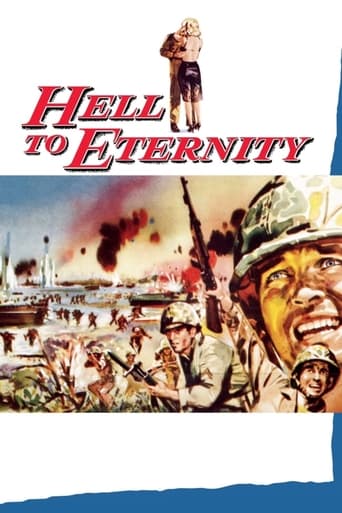tcroldan
Gabaldon was born and raised in Boyle Heights and attended Roosevelt High School with my brother-in-law Edwardo. He was not rejected by the Marines because of his ethnicity (Mexican-American) but because at 5'4" tall he did not meet Marine standards. It should be noted that the Marines were not adverse to recruiting in predominately Chicano communities. Guy was not "raised" by a Japanese family, but he did spend a couple of his teen year's with a Japanese family where he learned some basic Japanese. He was far from fluent in Japanese. However, the Marine Corps recruited him because they believed his knowledge of Japanese would be useful. The movie went to great lengths to hide Guy's true ethnicity. First, he was portrayed by Jeffrey Hunter, whose most notable role was playing 6'tall, blond blue eyed Jesus Christ. Guy described himself as "swarthy." In addition, there is a scene where the mamasan, in order to distinguish him from her Japanese grandchildren, refers to Guy as her "All American son." I once saw the movie on the History Channel. After the movie there was a panel discussion by historians. The final obligatory question was why the movie never mentioned that Guy was Mexican-American. The historian briefly answered that the movie was focused on the treatment of Japanese Americans during WW II and that Guy's ethnicity would have distracted from that. REALLY! Seems to me it would have made the story even more interesting. Typical Hollywood. Part of selling a movie means you have to make a white guy the central character and hero. More Hollywood is the David Jansen part and the party in Hawaii.
kenjha
This is an overlong and corny drama about a white American raised by a Japanese family who ends up fighting the Japanese in WWII. The scenes have a tendency to go on too long, particularly the battle scenes. Although based on a true story, it seems situations are contrived just to take advantage of the fact that a Japanese-speaking American is present among the U.S. troops. Karlson has made some interesting films, but this is not one of them. The cast includes likable actors but the performances range from mediocre to bad. Hayakawa gives what appears to be an impassioned speech to his troops, but unfortunately it's in Japanese and there are no subtitles.
thinker1691
When the United States of America went to war with Imperial Japan, many a Japanese national joined the armed forces and served the U.S. with distinction and honor. Among those who stood out was this story of a young Chicano from Los Angeles. Good looking Jeffrey Hunter, plays Guy Gabaldon who was raised by a Japanese foster family. Despite the discredit of government officials who interned Japanese/American citizens at the beginning of World War II, the people endured their imprisonment with dignity and patience. Gabaldon, turned down by his own draft board, nevertheless, joins the Marines and meets two close friends, played by David Janssen and Vic Damone. The three make this story touching and believable and their combat experience creates a worthwhile saga. The movie centers on the volatile hard fought conflict on the island of Saipan, where a determined enemy refuses to surrender. Interestingly enough, Guy Gabaldon risks life and limb, saving the lives of thousands of America soldiers and Japanese civilians, yet fails to be nominated for the Medal of Honor. A great and Noble film which has since become a war-time Classic. ****
junobuggo
I have had the privilege of viewing this movie on numerous occasions. Back when I was growing up, war movies, such as this, were shown on TV quite often. This movie was one of the many small bits and pieces of how I view certain events and human behaviors that make up my personality (in a positive way). Fortunately, even thought the movie takes some liberties with the truth about the life of Guy and his life, the more important moral messages about war, human emotions, race relations and the Japanese Internment controversies more than make up for these inaccuracies. For whatever reasons, this movie, I believe, has allowed me to become a more accepting/open human being of other cultures and races. It taught me family values and the frailty of the human condition (not to mention the horrors of war). Given this was a "war movie", it is a credit to the director, actors and writers that I was affected in other more important areas of my makeup than that of just history and/or war. I salute this endeavor. I highly rate it. Particularly for those who have problems with the issues I mentioned above. May Guy rest in peace (1926 - 2006)





